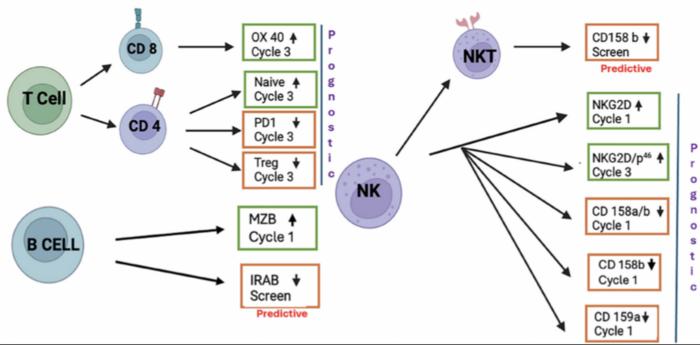
Pomalidomide (POM) has emerged as a pivotal agent in the treatment landscape for multiple myeloma, a malignancy that significantly compromises the immune system, rendering patients susceptible to a myriad of complications. Recent insights, shared in an editorial published in Oncoscience by researchers from esteemed institutes such as the Dana-Farber Cancer Institute and Harvard Medical School, underscore the drug’s potential to enhance immune profiles in affected patients. By properly integrating pomalidomide with standard treatment regimens, the study outlines the drug’s role in fostering a robust immune response, which is crucial for improving patient outcomes in this challenging disease.
The mechanism through which pomalidomide operates has garnered considerable attention in the context of multiple myeloma. Conventional treatments, while beneficial, often fail to sustain long-term remission due to the disease’s inherent aggressiveness. Clinical studies highlighted in the editorial indicate that the addition of pomalidomide to treatment plans featuring standard options like bortezomib and dexamethasone significantly boosts patients’ immune responses. The enhancement of T cells and natural killer (NK) cells, integral components of the immune system, is particularly critical, as these cells play pivotal roles in identifying and eradicating malignancies.
As researchers delve deeper into the biological underpinnings of pomalidomide’s efficacy, it becomes apparent that the drug targets Cereblon, a crucial component of the CRL4 E3 ubiquitin ligase complex. This interaction leads to the degradation of Ikaros and Aiolos, proteins that repress T cell activity. Consequently, by dismantling these inhibitory pathways, pomalidomide facilitates an environment where immune cells can function optimally, enhancing their capacity to combat cancer cells. This intricate molecular action not only underscores pomalidomide’s unique position among treatment modalities but also sheds light on its potential as a cornerstone in myeloma therapy.
Furthermore, the clinical implications of pomalidomide’s utilization are compelling. According to the findings discussed in the editorial, patients receiving pomalidomide in conjunction with traditional therapies experienced an extended duration of progression-free survival—20.7 months against 11.6 months for those without the drug. Such stark differences in outcomes illustrate the promise that immunomodulatory agents hold in managing multiple myeloma, presenting a beacon of hope for patients undergoing this arduous journey.
Observational studies suggest that the immune-enhancing effects of pomalidomide may contribute to its superior performance in patients with relapsed or refractory myeloma. Given that the disease frequently recurs despite prior interventions, the restoration of immune functionality could serve as a strategic advantage in curtailing disease progression. Researchers advocate for a paradigm shift wherein the immunomodulatory properties of POM are deliberately leveraged to optimize treatment protocols for vulnerable patient populations.
Cancer research frequently emphasizes that the immune system’s ability to recognize and eliminate tumors is a critical determinant of therapeutic success. The comprehensive analysis presented in the editorial encapsulates a broader narrative—the evolving understanding of the interplay between immunotherapy and conventional cancer treatments. By establishing a symbiotic relationship between these approaches, clinicians may significantly enhance treatment efficacy and patient survival rates in multiple myeloma.
Pomalidomide’s potential extends beyond mere disease management; it also embodies a novel strategy aimed at re-establishing immune competence in a demographic often marginalized by suboptimal responses to traditional therapies. The urgent need for new strategies in managing multiple myeloma—a condition notorious for its resilience—accentuates pomalidomide’s role as an invaluable adjunct therapy.
As researchers continue to elucidate the precise mechanisms and optimal administration of pomalidomide, ongoing clinical trials are likely to provide further insights into its benefits and potential combinations with other agents. The editorial serves as a clarion call for continued investigation into combinatorial therapies that harness immune modulation alongside established regimens, ultimately striving for better patient outcomes and quality of life.
The integration of cutting-edge research into clinical practice is paramount for realizing the full potential of immunotherapy in treating hematological malignancies. Pomalidomide exemplifies how targeted approaches can yield substantial improvements in patient management, encouraging a deeper exploration into this category of drugs as frontline therapies.
In summation, the editorial encapsulates a critical juncture in the therapeutic landscape of multiple myeloma, where pomalidomide’s immune-boosting properties signify a transformative approach in combatting a persistently challenging disease. As the field moves forward, the hope is that a harmonization of immunotherapy with traditional treatments will not only enhance patient outcomes but also redefine the long-term management of multiple myeloma, fostering a future where remission and survivorship are possible for a greater number of patients.
Subject of Research: Cells
Article Title: Pomalidomide improved immune profiles in myeloma
News Publication Date: 14-Jan-2025
Web References: Oncoscience
References: DOI
Image Credits: © 2025 Seah et al.
Tags: CereblonClinical TrialsCombination TherapiesImmune responseImmunomodulatory AgentsImmunotherapyMultiple MyelomaNK CellsPomalidomideProgression-Free SurvivalRelapsed/Refractory MyelomaT Cells





